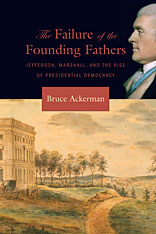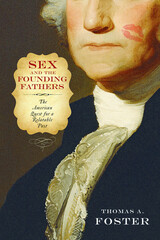
The ink was barely dry on the Constitution when it was almost destroyed by the rise of political parties in the United States. As Bruce Ackerman shows, the Framers had not anticipated the two-party system, and when Republicans battled Federalists for the presidency in 1800, the rules laid down by the Constitution exacerbated the crisis. With Republican militias preparing to march on Washington, the House of Representatives deadlocked between Thomas Jefferson and Aaron Burr. Based on seven years of archival research, the book describes previously unknown aspects of the electoral college crisis. Ackerman shows how Thomas Jefferson counted his Federalist rivals out of the House runoff, and how the Federalists threatened to place John Marshall in the presidential chair. Nevertheless, the Constitution managed to survive through acts of statesmanship and luck.
Despite the intentions of the Framers, the presidency had become a plebiscitarian office. Thomas Jefferson gained office as the People's choice and acted vigorously to fulfill his popular mandate. This transformation of the presidency serves as the basis for a new look at Marbury v. Madison, the case that first asserted the Supreme Court's power of judicial review. Ackerman shows that Marbury is best seen in combination with another case, Stuart v. Laird, as part of a retreat by the Court in the face of the plebiscitarian presidency. This "switch in time" proved crucial to the Court's survival, allowing it to integrate Federalist and Republican themes into the living Constitution of the early republic.
Ackerman presents a revised understanding of the early days of two great institutions that continue to have a major impact on American history: the plebiscitarian presidency and a Supreme Court that struggles to put the presidency's claims of a popular mandate into constitutional perspective.

Biographers, journalists, and satirists have long used the subject of sex to define the masculine character and political authority of America's Founding Fathers. Tracing these commentaries on the Revolutionary Era's major political figures in Sex and the Founding Fathers, Thomas Foster shows how continual attempts to reveal the true character of these men instead exposes much more about Americans and American culture than about the Founders themselves.
Sex and the Founding Fathers examines the remarkable and varied assessments of the intimate lives of George Washington, Thomas Jefferson, John Adams, Benjamin Franklin, Alexander Hamilton, and Gouverneur Morris from their own time to ours. Interpretations can change radically; consider how Jefferson has been variously idealized as a chaste widower, condemned as a child molester, and recently celebrated as a multicultural hero.
Foster considers the public and private images of these generally romanticized leaders to show how each generation uses them to reshape and reinforce American civic and national identity.
READERS
Browse our collection.
PUBLISHERS
See BiblioVault's publisher services.
STUDENT SERVICES
Files for college accessibility offices.
UChicago Accessibility Resources
home | accessibility | search | about | contact us
BiblioVault ® 2001 - 2024
The University of Chicago Press









